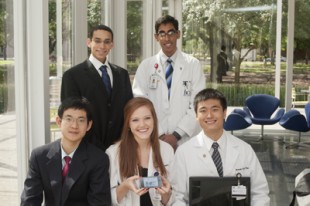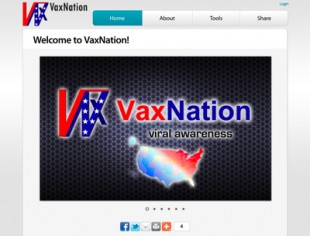Houston students win Go Viral prize for social media-conscious health data
The Institute of Medicine and the National Academy of Engineering has awarded a team of students from three Houston institutions first prize in the Go Viral to Improve Health collegiate challenge for the team’s social-network-connected system to track vaccinations.

The VaxNation team from Rice University, Baylor College of Medicine and the University of Texas School of Public Health won first prize in this year’s Institute of Medicine of the National Academies’ “Go Viral to Improve Health” competition. Standing, from left: Peter Kamel and Hashim Zaidi; seated, George Chen, Emma Corbett and Ronnie Ren. Photo by Jeff Fitlow
VaxNation is a free immunization planner and tracker that integrates the Web, social media and mobile devices to make online records easily accessible to patients, parents and clinicians from anywhere with an Internet connection.
Team members are Hashim Zaidi and Emma Corbett, medical and public health students in a joint degree program at Baylor College of Medicine (BCM) and The University of Texas School of Public Health, part of The University of Texas Health Science Center at Houston (UTHealth); Ronnie Ren, a medical student at BCM; and Peter Kamel and George Chen, who graduated from Rice University’s George R. Brown School of Engineering this year. Zaidi and Ren are also alumni from Rice (2011).
The team will accept the $10,000 prize June 6 at the Health Data Initiative Forum III in Washington, D.C., where the students will unveil their winning app, one of 51 contest entries. The day’s events will include a keynote talk by Kathleen Sebelius, secretary of the Department of Health and Human Services.
The Web-based VaxNation app ties vaccination data for individuals to a reminder system and information about the diseases each immunization addresses. It also incorporates the properties of social media that allow the program to go “viral,” a key goal of the contest meant to inspire positive action at the community level.
“This program makes it easier for families to track vaccination data and learn critical information about vaccines,” said Steven Abrams, a professor of pediatrics at BCM and a neonatologist at Texas Children’s Hospital, who served as the students’ adviser. “The delivery through the Web, social media and mobile devices brings this information to families through effective communication outlets.”
Corbett, who heard about the contest in February and pitched it to her friends, said the team members’ own experiences inspired VaxNation. “We had started at Baylor the year before and remembered trying to get our immunization records, as all freshmen have to do,” she said. “They were fragmented, all over the place. I think everyone struggles trying to find them.”
Corbett said the need to simplify became obvious while she was shadowing a pediatrician and “trying to keep track of which parents needed which vaccines for which kids. When you have multiple kids and they’re all on different schedules, it gets kind of confusing.”
Kamel noted that with available vaccination schedulers, “there’s always some component lacking. There are apps for scheduling that don’t integrate with Facebook and programs that don’t link to your smartphone. Or they don’t give you reminders,” he said. “There’s always something that falls short.”
VaxNation allows patients and parents to open family accounts, link them to their Facebook pages and find information on vaccinations supplied by the Centers for Disease Control and Prevention (CDC). The program automatically calculates age-appropriate immunizations based on CDC guidelines. The team hopes to develop stand-alone smartphone apps and links to medical record-keeping programs.
“Vaccinations are key to preventing a multitude of diseases and have led to significantly increasing life expectancy around the world,” said Roberta Ness, dean of The University of Texas School of Public Healthand a member of the Institute of Medicine. “These students have combined public health, medicine and innovation in a way that is accessible to everyone in a product that can be used by everyone.”
Contest organizers would like to see the program go viral – in the best possible sense. By tying VaxNation to Facebook, Twitter, Google Plus and more, they hope parents will encourage their online acquaintances to take advantage of the program’s easy record keeping, automatic alerts and access to information.
The social nature of VaxNation allows the program to track referrals and perhaps offer incentives for users to spread the word, Zaidi said. The location-aware site helps users find nearby clinics and schedule appointments.
“Today’s engineering and science students want to use their education to have broad societal impact,” said Edwin “Ned” Thomas, the William and Stephanie Sick Dean of Engineering at Rice. ”Teaming together, our students first recognized and then created a solution to a really important problem on social media platforms that are nowadays part of everyone’s tool/play set.”
To raise awareness of the program, the team is partnering with Scalable Health, an initiative to develop innovative medical devices and applications founded by Ashu Sabharwal, an associate professor of electrical and computer engineering at Rice.
The students also hope to allay fears about vaccinations. “There’s a lot of misinformation out there about immunization rates falling and rumors that they cause autism, all false,” Corbett said. “Having one program that is free and easy to use seemed like a good solution for many problems.”
Zaidi said the rise in anti-vaccination movements has been propelled by myths and misinformation. “They result in unnecessary morbidity and mortality that, through our education component, we hope to alleviate,” he said.



This is such a great idea- I scarcely know my own vaccination record and I’m in the health field! It will be a very useful app for everyone. Go public health!